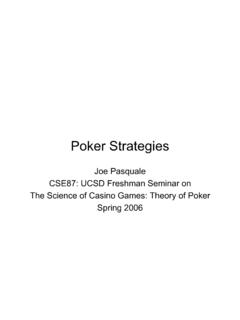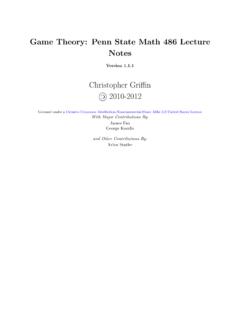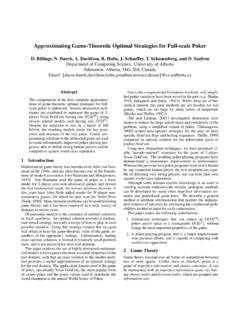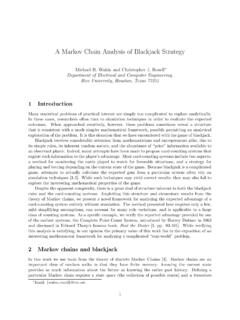Transcription of The Theory of Poker By David Sklansky - dompokera.ru
1 The Theory of Poker By David Sklansky A product of Two Plus Two Publishing SIXTH PRINTING October 2004 1 About David Sklansky David Sklansky is generally considered the number one authority on gambling in the world today. Besides his nine books on the subject, David also has produced two videos and numerous writings for various gaming publications. His occasional Poker seminars always receive an enthusiastic reception including those given at the Taj Mahal in Atlantic City and the World Series of Poker in Las Vegas. More recently David has been doing consulting work for casinos, Internet gaming sites, and gaming device companies. He has recently invented a new game called Poker Challenge, soon to appear in casinos.
2 David attributes his standing in the gambling community to three things: 1. The fact that he presents his ideas as simply as possible (sometimes with Mason Malmuth) even though these ideas frequently involve concepts that are deep, subtle, and not to be found elsewhere. 2. The fact that what he says and writes can be counted on to be accurate. 3. The fact that to this day a large portion of his income is still derived from gambling (usually Poker but occasionally blackjack, sports betting, horses, video games, casino promotions, or casino tournaments). Thus, those who depend on David 's advice know that he still depends on it himself. Other Books by David Sklansky Hold 'em Poker Getting The Best of It Sklansky on Poker Poker , Gaming, and Life Sklansky Talks Blackjack Gambling for a Living by David Sklansky and Mason Malmuth Hold 'em Poker For Advanced Players by David Sklansky and Mason Malmuth Seven-Card Stud for Advanced Players by David Sklansky , Mason Malmuth, and Ray Zee Preface This book is about the general theories and concepts of Poker play, which are operative in nearly every variation of Poker from five-card draw to Texas hold 'em.
3 It is not a how-to book in the sense of providing the basic rules and a step-by-step procedure for playing the various games. Beginning Poker players sometimes ask, "What do you do in this particular situation?" There is really no correct answer to that question because it's the wrong question. Rules of thumb that say to fold one hand, call with another, and raise with yet another simply won't get a Poker player beyond the beginning stages. The right question is: "What do you consider in this particular situation before determining what to do?" The Theory of Poker addresses itself to such considerations. It analyzes every aspect of a Poker hand from the ante structure to play after the last card has been dealt.
4 By explaining the logic of Poker , the book will, I hope, show the reader what kinds of things to think about in order to become a better player. To illustrate the concepts presented, I use primarily five games - five-card draw, seven-card stud, hold 'em, draw lowball, and razz or seven-card lowball. For readers who may not be familiar 2with one or another of these games, I give brief summaries of their rules in the Appendix. I also use standard Poker terms like flop, on board, sixth street, back-door flush, and the like. As much as possible, I explain these terms in the text, but readers can avail themselves of the Glossary of Poker Terms at the back of the book to check the definitions of any terms about which they are uncertain.
5 The Theory of Poker is an expansion and total revision of the book Sklansky on Poker Theory , written by David Sklansky and originally published by Gambler's Book Club of Las Vegas in 1978. That book was directed primarily to professional Poker players. This book is directed to Poker players in general, who know the basics, who may even be good players, but who want to delve deeper into the inner workings of the game. It is not an easy book, but a careful reading of it should reap rich rewards. Note: This book was formerly titled Winning Poker . 3 Chapter One Beyond Beginning Poker The beauty of Poker is that on the surface it is a game of utter simplicity, yet beneath the surface it is profound, rich, and full of subtlety.
6 Because its basic rules are so simple, anyone can learn Poker in a few minutes, and novice players may even think they're pretty good after a few hours. From the expert's point of view, the veneer of simplicity that deludes so many players into thinking they're good is the profitable side of the game's beauty. It doesn't take long for pool players or golfers to realize they're outclassed and to demand that a match be handicapped, but losers in Poker return to the table over and over again, donating their money and blaming their losses on bad luck, not bad play. It's true that in any given session the best of players can get unlucky. Going into the final day of the 1981 world championship of Poker , Bobby Baldwin of Tulsa, Oklahoma, had a substantial lead over the eight other surviving players, Within a couple of hours he had two hands beat when his opponents outdrew him on the final card on 21 -to-1 shots.
7 Suddenly he was out of the tournament, Coincidentally, in both hands Baldwin's opponent needed one of the two remaining queens among the 44 unseen cards, and he got it. However, it is more likely for a good player like Baldwin to suffer these bad beats, as they are called, than for an average player or a weak player to suffer them. "I've heard good players complain to me about how they get drawn out on ail the time," Baldwin said after the 1981 tournament. "But if they want to better their game and better their emotional state while playing, they should realize it's a mirage. If you are an excellent player, people are going to draw out on you a lot more than you're going to draw out on them because they're simply going to have the worst hand against you a lot more times than you have the worst hand against them.
8 There's no way you're going to draw out on anybody if you don't get all your money in there on the worst hand." As Baldwin implies, expert players do not rely on luck. They are at war with luck. They use their skills to minimize luck as much as possible. They figure they're getting the best of it, and they leave lucky draws to their weaker opponents. To the extent that they are getting the best of it, they will win more often than they lose. Over the long run everybody gets the same proportion of good and bad cards, of winning and losing hands. Beginning Poker players rely on big hands and lucky draws. Expert Poker players use their skills to minimize their losses on their bad hands and maximize their profits on their big hands.
9 They also are able to judge better than others when a big hand is not the best hand and when a small hand is the best hand. Whatever your level of play, the succeeding chapters will introduce you to theories and concepts of Poker that will eliminate your reliance on luck and lead you to become an expert who relies on his skills. For above all, you must remember that Poker is not primarily a game of luck. It is a game of skill. The Forms of Poker Poker is a generic name for literally hundreds of games, but they all fall within a few interrelated types. There are high games like seven-card stud and Texas hold 'em, in which the highest hand in the showdown wins, and low games like draw lowball and razz, in which the lowest hand wins.
10 There are also high-low split games, in which the best high hand and the best low hand split the pot. Among high, low, and high-low split games there are those like five-card draw, in which the hands are closed, and those like seven-card stud, in which some of the players' cards are exposed for all to see 4 Jokers, wild cards, and special rules may be introduced into any of these games to create such aberrations as Baseball, Follow the Queen, Anaconda, and scores of other variations that have spiced up home Poker for decades. Paradoxically, the two types of players who favor these exotic Poker variations are generally amateurs who want a lot of action and hustlers who prey on these amateurs because their long experience allows them to adjust more easily to unusual games than their amateur opponents tan.









